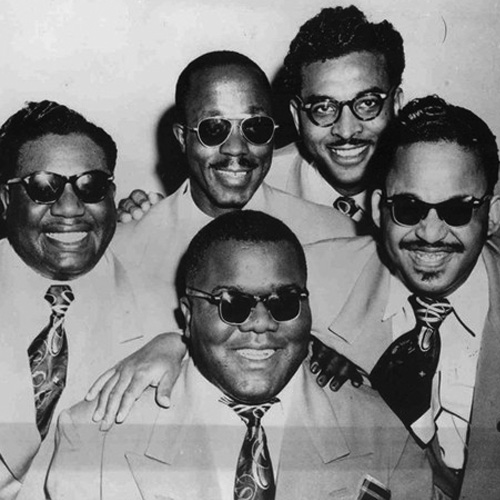
The Five Blind Boys of Mississippi
The Five Blind Boys of Mississippi was one of the most popular and influential post-war gospel quartets. Powered by the vocals of lead singer Archie Brownlee, their single “Our Father” reached the Billboard R&B charts in the early 1950s, one of the first gospel records to do so.
The group originated in the 1930s as a quartet of students from the Piney Woods School for the blind near Jackson, Mississippi. The students — Brownlee, Joseph Ford, Lawrence Abrams, and Lloyd Woodard — originally sang under the name “the Cotton Blossom Singers”, performing both jubilee quartet and secular material, to raise money for the school. On March 9, 1937, Brownlee and the others recorded sacred tunes (as the Blind Boys) and three secular numbers (as Abraham, Woodard, and Patterson) for Library of Congress researcher Alan Lomax. After graduation in the early forties, they began performing professionally, often backed by a female jazz band known as “The International Sweethearts of Rhythm.”singing pop music as the Cotton Blossom Singers and religious material under the name the Jackson Harmoneers. In the early 40s, Melvin Henderson joined, making them — like many so-called quartets — actually a quintet.
In the mid-40s, Brownlee and the others relocated to Chicago, and changed their name to the Five Blind Boys of Mississippi. Under the influence of R.H. Harris of the Soul Stirrers, Brownlee moved away from the jubilee style of singing and towards a more popular hard gospel style. Even though Harris’ influence was pervasive — the Blind Boys at first covered Soul Stirrers songs almost exclusively — Brownlee’s high voice, which could move from a sweet croon to a devastating scream, was one of the most recognizable in gospel. His dynamic stage presence also became legendary: though blind from birth, he would sometimes leap from a stage into the screaming audiences below .
With the addition of hard gospel shouter Rev. Percell Perkins (who replaced Henderson), the Blind Boys moved into their period of greatest fame. Perkins, who was not blind, became the groups manager, and they began to record, first for Excelsior in 1946, then for Coleman in 1948. Ford was replaced by J.T. Clinkscales, in that year, and in 1950 the group moved to Peacock Records where they recorded the hit “Our Father” at their first session.
Brownlee died of pneumonia while touring in New Orleans on February 8, 1960 at the age of 35. and not long after Perkins left as well. Brownlee was replaced by the very able lead Roscoe Robinson, and quartet veteran Willmer “Little Ax” Broadnax took the position of second lead. Broadnax, in particular, had a high voice which was comparable, in some respects, to Brownlee’s. Other singers who worked with the group for a time included Rev. Sammy Lewis, Rev. George Warren, and Tiny Powel. By the end of the 60s, the group had released 27 singles and 5 albums for Peacock. In the 70s and early 80s they recorded some material for Jewel, and they continued to tour into the 90s. Of the two remaining members of the original group, Lloyd Woodard died in the mid-1970s, and Lawrence Abrams passed on in 1982.
The Five Blind Boys of Mississippi should not be confused with The Blind Boys of Alabama, a group led by Clarence Fountain. There is some dispute as to which of the two groups was named first. Some sources say that the Five Blind Boys took their name when Percell Perkins joined them in the mid-40s. According to Fountain, however, the two groups were actually christened simultaneously during a Newark, New Jersey quartet contest in 1948.
– Wikipedia
